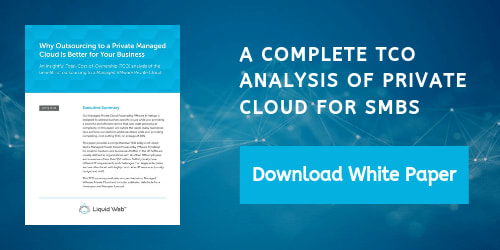
Are you wondering what a private cloud server is? Confused as to the difference between private cloud computing and public cloud hosting, and unsure which services or solution you require?
Cloud computing has benefits for numerous types of organizations, but as is the case with many new and powerful technologies, it is easy for those considering adopting cloud to get caught up in the hype that surrounds it.
In order to fully benefit from a move to the cloud, organizations must make a number of important decisions.
First, you must decide what kind of cloud environment to adopt.
While hyperscale public cloud providers include some famous companies with familiar names, for many organizations, a private cloud is a more appropriate choice.
Let’s start with definitions for cloud computing and what a public cloud is vs a private cloud server.
What is Cloud Computing?
In a computing context, cloud refers to “storing and accessing data and programs over the Internet instead of your computer’s hard drive,” according to PC Magazine. The servers storing the data and running the programs are usually hosted by a cloud service provider.
What is a Public Cloud?
Public cloud is defined by Gartner as “a style of computing where scalable and elastic IT-enabled capabilities are provided as a service to external customers using Internet technologies.” It is generally offered on a pay-per-use model and as a multi-tenant environment, meaning data for multiple organizations may reside on the same physical server.
While this can create economies of scale and cost savings, this is not always the case, as explored below.
What is a Private Cloud?
A private cloud server is an isolated and secure environment made up of resources pooled from multiple servers using virtualization. This type of cloud is only available to select organizations rather than the general public and, at the same time, ensures that those organizations are sufficiently isolated from each other. It is generally offered as a monthly lease.
A private cloud offers flexibility, cost savings, security, and control benefits. These benefits are particularly valuable for businesses with predictable workloads or customization requirements and businesses in regulated industries.
5 Benefits of a Private Cloud
The five main benefits organizations can attain by running their IT systems in a private cloud server environment are improved resource utilization, reduced costs, increased security, regulatory compliance, and more flexibility.
1. Improved Resource Utilization
Many of the benefits of private cloud are delivered by the virtualization technology that underlies all types of cloud computing. Most servers are underused, and virtualization provides private cloud users with improved resource utilization, meaning workloads can be deployed to a different physical server as demands change from services. Alternatively, resources dedicated to the particular server can also be adjusted to meet the changing demands of any specific application.
2. Reduced Costs
This flexibility and improved resource utilization can help organizations ensure application performance, but also reduce costs by getting the most out of their servers. A private cloud environment will not only save money over a traditional on-premise environment, but for some organizations, it costs less than a public cloud environment.
Low cost is generally considered to be the primary benefit of public cloud services, and it undoubtedly provides cost savings to some organizations. Netflix, for example, is not in a heavily regulated industry, it predominantly runs one kind of workload, and its usage constantly fluctuates throughout every time zone around the world.
Private cloud computing, especially if it’s running on single-tenant dedicated VMware, is actually less expensive for many businesses, as shown by a recent study from 451 Research. Experts suggest that due in large part to hidden charges, including network bandwidth, businesses are often not aware of the total cost of ownership (TCO) of a public cloud until the bill arrives, and the research shows that 41 percent of IT decision-makers find their private cloud to be less expensive than a comparable public cloud. Further, 24 percent said they pay a premium of 10 percent or less for their private cloud, which is well worth it for organizations benefiting from the other advantages of the private cloud.
3. Increased Security
Security statistics comparing cloud environments can be contradictory or misleading, due to methodological choices such as grouping on-premises and hosted private cloud environments together, or comparing different environments without considering the different types of organizations that use them (as explored below). IT professionals have clear views, however, as research by security vendor Ixia shows 90 percent of them are concerned about data and application security in public clouds.
Ultimately, security experts tend to recommend a private cloud because it can provide security advantages over a public cloud. While any cloud environment requires robust antivirus and firewall protection, a private cloud runs on certain physical machines, which makes its physical security easier to ensure. Cloud access is also more secure with a private cloud environment because it is accessed through private and secure network links, rather than the public Internet.
4. Regulatory Compliance
The popularity of private cloud environments for organizations with compliance concerns is partly due to its security and control benefits. Another reason is that service providers offering hosted private clouds can help address significant compliance elements such as HIPAA Compliant Hosting and PCI Compliant Hosting. Some organizations may have little choice but to utilize a private cloud to gain the advantages of cloud computing while retaining regulatory compliance.
5. More Flexibility
Organizations migrating from a legacy on-premise system often find it difficult to deploy their workloads to the public cloud, as it cannot be customized to support any application.
A successful migration is critical to achieving the intended benefits of the new environment, and the higher success rate of migrations to private clouds is another potential cause of a lower TCO than public cloud.
Who Should Use a Private Cloud?
Once an organization has determined its cloud needs and priorities, it can determine if the private cloud computing is the right kind of IT environment.
Required HIPAA Compliance
For some organizations, the private cloud will be the only realistic option to ensure regulatory compliance. For example, HIPAA requires that electronic protected health information (ePHI) is created, received, stored, and transmitted in a way that ensures its confidentiality, integrity, and availability.
The security and privacy protections of HIPAA were expanded by the Health Information Technology for Economic and Clinical Health Act (HITECH). Liquid Web is HITECH-certified by a third-party auditor, providing organizations with the assurance that their private cloud environment meets the standards specified by HIPAA’s Privacy Rule and Security Rule.
Predictable Server Usage
In addition to those with HIPAA or other compliance concerns, organizations with relatively predictable and consistent resource demands should consider using a private cloud. Those organizations are more likely to be able to maximize their resources, and therefore cloud spends, and less likely to take full advantage of the elasticity that is one of the main strengths of the public cloud.
Need for Flexibility
Private clouds should also be considered by organizations that can benefit from the increased flexibility of a virtualized environment. Many organizations, particularly among medium and large businesses, run a variety of different applications, each residing on its own hardware.
Virtualizing a server that runs a certain application, such as email, allows the organization to increase or decrease the resources available to it. This enables performance improvements, as servers running more resource-intensive applications are provisioned with more computing power or memory.
It also delivers cost savings, as the increased resources are drawn from otherwise-underutilized servers, rather than leased or purchased separately.
To determine what cloud deployment is required, an organization should evaluate:
- Flexibility needs.
- Security needs.
- Compliance requirements.
- Cost.
- Applications used.
- Suitable environments.
- Organizational capacities.
A quality cloud service provider offering hosted private cloud solutions can help with these evaluations, and make recommendations specific to the organization.
Ready to Deploy a Private Cloud?
Liquid Web’s VMware Private Cloud gives you cloud performance on fast, secure enterprise infrastructure. It’s like having your own personal data center that is fully managed, easy to migrate to, features a personalized login, and works on a simple and transparent pricing model. It is ideal for resellers, agencies, and enterprises. Liquid Web’s Dedicated Server Hosting also allows us to partner with your IT team to design a hosting solution tailored to your private cloud hosting needs.
[ad_2]
Source link







